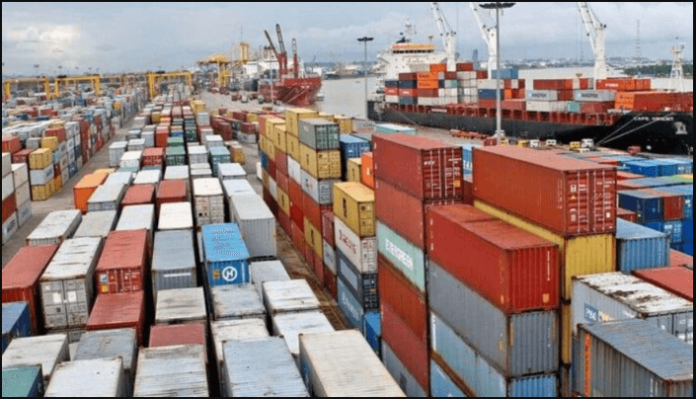Forex scarcity reduces imports to 65% at seaports
By Jeph Ajobaju, Chief Copy Editor
Imports through the seaports dipped to 65 per cent in late October caused by unstable foreign exchange (forex) and naira devaluation.
The Tin-Can Island Command of the Nigeria Customs Service (NCS) confirmed a reduction in imported cargo, making it difficult to meet revenue target.
A dollar exchange for N1,200 in the black market and N848 in the Nigerian Foreign Exchange Market (NAFEM).
The naira has continued to weaken against the dollar across all market segments since the Central Bank of Nigeria (CBN) lifted the ban on 43 items previously restricted from accessing forex from the investor’s and exporters’ (I&E) window now NAFEM.
Sources said there is little or no ship berths in the Apapa and Tin-Can Island ports especially in terminals handling bulk cargoes. And truckers have complained about the drop in cargo haulage.
“The last four weeks have been very challenging for truck owners. For instance, I have not moved cargoes out of the port in the last two weeks,: A truck owner, Yusuf Liadi, lamented.
Former acting President of the Association of Nigerian Licenced Customs Agents (ANLCA), Kayode Farinto, also confirmed cargo imports have dropped to 65 per cent.
His words: “Removing the restrictions on 43 items from accessing the forex market by the federal government is a welcome development and I do know that our import has dropped to 65 per cent in the last one or two weeks.
“But lifting the restriction will encourage importers because placing prohibition on these items when they are not on import prohibition list was encouraging false declaration, corruption and adding to cost of cargo clearance.
“However, now that the importers know they can go abroad, bring these items and open Form M for it, then it’s an encouragement for the importers to do the right thing and I believe that will grow the nation’s economy as well.”
However, Farinto predicted import improvement based on the policy will not be felt until the middle of December 2023 or first quarter of 2024.
“It is a welcome development, it will grow the economy and increase the level of import into the country.
“It will take another 60 days to see the boost because import is not about going off the shelves to pick your import and we know a large chunk of our trade is to China and the far East Asia, so before one can travel and come back, it will take another 60 days.
“It’s a welcome development that will boost the economy and increase the level of imports. We should expect an import boost between the first and the second week of December, and by the middle of January 2024, the effect will be massive.”
__________________________________________________________________
Related articles:
Abuja angling for N124b import tax revenue yearly to fund institutions
Manufacturers lament yoke of multiple taxation
Rice imports down from 1.2m mt to 438 mt
_________________________________________________________________
Lucky Amiwero (National Council of Managing Director of Licensed Customs Agents (NCMDLCA) President)
“Exchange rate is moving very fast upward and you know most imports are contractual. Most of these imports are supposed to be paid back at a specific time and when you bring them in and you realise that before the cargoes arrive the country, there is an increase,” Amiwero said, per reporting by LEADERSHIP.
“The challenge is that there is no stability and because of that a lot of people are no longer importing because of the floating exchange rate that is moving at a very high speed.
“Foreign exchange is a critical factor when a country is import dependent like Nigeria. This is because Nigeria is not a manufacturing country as we import almost everything. We need to aid imports by giving export subsidies to survive.
“Exchange rate is one of the important factors affecting importation because blaming the Customs for low import is an act of ignorance. We cannot fault the Customs because they have not increased any levy, they only moved with the exchange rate.
“I saw an agent protesting against the Customs and I told him it’s not the Customs’ fault but that of the economy. It’s the exchange rate and clearing agents must understand the dynamics of the economy.
“The exchange rate has a pivotal role to play, the exchange rate is not consistent, predictable and transparent. It is clumsy and shaky that importers have to stayed back to watch how things unfold.
“The Central Bank of Nigeria (CBN) has a lot of work to do, to give confidence back to the system and ensure stability of the forex market. All the policies the government is turning out daily are not practical or halting the free fall of naira.
“Now, the economy is fragile, import dominated and a lot of the people are getting poorer as poverty rate and purchasing power are going up daily.”
Amiwero sought removal of impediments against seamless facilitation of exports, saying only import can balance Nigeria’s trade.
“The country must be able to look at export through the impediments. Impediments such as pricing, evaluation, packaging among others must be tackled.
“Government needs to remove obstacles to export. When the obstacles are removed, it will encourage export.
“Government should introduce a subsidy on export for people to see it as an alternative and reduce over reliance on import because if export is not moving and there are no backup plans there will be problems, as we are currently experiencing.”




